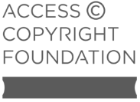-

2021
annual report
A collective voice serving
creators, publishers and
content users in the digital age.Natasha Deen, author
Just before I was elected in 2013 to the Access Copyright Board, I joked that it
wasn’t so much that I had volunteered to put my name forward, it was more a case of being “voluntold”.
Thinking back to that moment, I never would have imagined that it was just the start of close to an
entire decade immersed in the work that the organization does. As with many things in life, it was
unplanned but has been immensely gratifying.
When I joined the Board, I only had a passing understanding of Access Copyright and its
role in supporting Canada’s creative sector. Now, as my time on the Board winds to a close, I
express a deep and abiding appreciation of the vital work that the dedicated and tenacious staff of
Access Copyright undertakes and what it means to creators, publishers and those whose jobs rely on
the ready availability of quality, Canadian content.
To say that it’s been an honour to have had this privilege, especially with the past seven
years serving as Board Chair, is an understatement.
When reflecting on the past nine years, I am particularly pleased to recall how the Board
has transformed from one composed entirely of creator and publisher representatives to one with a
deep variety of viewpoints, experiences and expertise. This diversity has not only enriched the
discussions that take place around the Board table (or, as has been mostly the case during the past
two years, the Zoom screen), but has also equipped the Board to make more inclusive, considered and
forward-looking decisions to guide Access Copyright’s strategic direction.
As I write this, Canadian creators and publishers continue to be deprived of payment for
the copying of their works by most educational institutions outside of Quebec. There are promising
signs that the government recognizes that a legislative solution is the only path forward to a
sustainable marketplace for educational works and to address the considerable damage that Canada’s
creative sector has endured over the past decade. The tireless and unceasing efforts of Access
Copyright is a huge reason why there is now optimism that long-needed changes to Canada’s
Copyright Act may finally be enacted. I have no doubt that Access Copyright will play a
critical role in helping to get this to the finish line. Even as I retreat to the sidelines, I will
be rooting hard for the future success of Access Copyright and the creators and publishers it
represents.
Cameron Macdonald
Chair of the Access Copyright Board

One of the things I have always cherished about my 20 years at Access Copyright is the higher purpose at play in the work we do; namely, that the creations of Canadian writers, visual artists and publishers have value and that when they are copied and shared, that usage should be paid for.
Roanie Levy
President & CEO, Access Copyright & Prescient Innovations
Image credit: Jennifer Rowsom Photography


copyrights of
creators and
publishers to
foster a sustainable
ecosystem

our products and services to
adapt to our changing environment, increase value to our customers, and grow distributions to
our creators

rightsholder-focused thought
leadership and innovation with those who create, use and value content

Raquel Rivera, author
This year marked a critical point in the decade long struggle for creators and publishers to be paid for the mass and systematic copying of their works by the education sector. The disappointing decision of the Supreme Court of Canada in the York University litigation served to crystalize the urgent need for the federal government to implement legislative reform to restore a functioning market and to ensure the continued creation of content for Canadian classrooms.
A CALL OTTAWA CAN’T IGNORE
We were encouraged to see the passionate engagement and participation of Canadian creators and publishers in several advocacy initiatives as part of the ongoing I Value Canadian Stories campaign.
150+
creators participated in several social-media campaigns
25,000+
organic social-media content engagements
4,339,770
promoted social-media impressions
8,165
unique page views of the I Value Canadian Stories website
150+
creators participated in several social-media campaigns
25,000+
organic social-media content engagements
4,339,770
promoted social-media impressions
8,165
unique page views of the I Value Canadian Stories website
On March 30, 2022, Access Copyright received a letter from the Ministry of Education in British Columbia, stating that the Ministry will not resume tariff payments. This position taken by the Ministry is extremely disappointing and we strongly disagree with it. Access Copyright will engage in discussions with the Ministry regarding the resumption of tariff payments.

Corey Redekop, author
Despite a challenging copyright landscape, our Canadian corporate customer base held steady in 2021 even as our overall corporate licensing revenue declined by 7% compared to 2020. This decrease is attributable to a drop in foreign corporate-licensing revenue as well as unfavourable foreign exchange rates.
We engaged more deeply with our customers through in-depth interviews with licensees and a customer survey to assess how else we might better serve them and also debuted an instructional video for our online search tool to make it easier for our licensees to discover the millions of works in our repertoire.
As part of Access Copyright’s commitment to diversity and inclusion, we launched a mentorship program in partnership with the University of Toronto to provide guidance and advice to young BIPOC students. Mentees in the program in 2021 benefited from coaching by Access Copyright staff members in the communications and legal fields. Our diversity and inclusion efforts have also included engaging our staff in training on such topics as unconscious bias.




2021’s focus was on preparing to launch Imprimo as the first live use case for the Attribution Ledger. Imprimo is a “LinkedIn for visual artists” – an online platform for artists to manage their works, be discovered, gain exposure and take their career to the next level.
Prior to its public launch on March 28, 2022, over 1,000 artists signed up to our waitlist to be among the first invited to explore Imprimo and build their online CV.
Imprimo exemplifies Prescient Innovations’ vision of solving the attribution problem to ensure that creators are properly attributed and paid when their works are used. Imprimo is the first live use case for the Attribution Ledger – a trusted source providing an authoritative, verified connection between a work, its metadata and its creator(s) and/or rightsholder(s).
Imprimo is a project of CARFAC, COVA-DAAV and Regroupement des artistes en arts visuels du Québec (RAAV). It is built in partnership with Prescient Innovations — a subsidiary of Access Copyright — with funding from the Canada Council for the Arts.
In addition to building products, we presented several webinars on emerging technological trends including exploring the world of NFTs (non-fungible tokens) and their possible applications for the art and literary worlds, and a presentation by Roanie Levy on the Attribution Ledger at the World Intellectual Property Organization’s Impact of Web 3.0 on Cultural Industries event.
In 2021, Access Copyright recognized just over $11.2 million in revenue, which is higher than anticipated but still represents a decline of approximately $1.8 million from 2020. The decrease in revenue is primarily the result of lower licensing revenues from the education sector. Operationally, our expenses for 2021 came in at just over $6.4 million, which is in line with 2020 expenses when adjusted for a provision for doubtful accounts of $1 million recorded in 2020, reflecting the failure of the British Columbia Ministry of Education to pay royalties owing under the Access Copyright Elementary and Secondary Schools Tariff. $6.5 million in royalties were distributed in 2021 to rightsholders, an expected but disappointing decline from 2020 that continues to reflect the urgent need for the federal government to reform the Copyright Act so that creators and publishers are fairly compensated for the copying of their works by the educational sector.
Charting the Impact of Fair Dealing for Education (2012-2021)*


* Revenue and distribution totals do not include retroactive K-12 Tariff royalties recognized in 2012, 2013 and 2019.


This chart predicts the 2021 split in domestic distributions based on the results of the 2020 publisher royalty survey.


In 2021, Access Copyright Foundation celebrated its 11th full year of providing support to creators and organizations engaged in the development and dissemination of publishable Canadian works in the literary and visual arts. During the year, the Foundation awarded $250,000 in grant funding to 75 recipients for research, professional development and events.
As well, the Foundation made several adjustments to its eligibility guidelines, including that successful applicants may be awarded a maximum of two grants within a 24-month period, so as to ensure the widest and most equitable opportunity available to the wide range of communities the Foundation serves.
Cameron Macdonald, Chair
Mark Lovewell, Vice-Chair
Linda D. McCollum, Treasurer
Arjun Basu
Lara Caplan
Sonya Lalli
Marcia Lea
Krys Ross
Kelly Shaw
Eric Enno Tamm
Roanie Levy, President & CEO
Roanie Levy, President & CEO
Michael Andrews, Chief Operating Officer
Claire Gillis, Chief Business Affairs Officer
Asma Faizi, General Counsel
JD Methot, Chief Revenue Officer (as of February 2022)
Sapanpreet Singh Narang, Chief Innovation Officer (until October
2021)
Amy Cormier, Head of Communications & Marketing
Rino Falcioni, Manager, Technology Services
Xin Ge, Manager, Accounting
Silvia Grunberg, Head of Royalties and Client Services
Joan Lewis-Milne, Head of Business Development
Stephen Sawyer, Lead, Design Research and Business Analysis
Canadian Artists’ Representation
Canadian Association of Professional Image Creators
Canadian Association of University Teachers
Canadian Authors Association
Canadian Society of Children’s Authors, Illustrators and Performers
Crime Writers of Canada
Federation of British Columbia Writers
League of Canadian Poets
Manitoba Writers’ Guild
Outdoor Writers of Canada
Playwrights Guild of Canada
Saskatchewan Writers’ Guild
The Writers’ Union of Canada
Writers’ Alliance of Newfoundland and Labrador
Writers’ Federation of New Brunswick
Writers’ Federation of Nova Scotia
Writers’ Guild of Alberta
Alberta Magazine Publishers Association
Association of Book Publishers of British Columbia
Association of Canadian Publishers
Association of Canadian University Presses
Association of Manitoba Book Publishers
Atlantic Publishers Marketing Association
Book Publishers Association of Alberta
Canadian Association of Learned Journals
Canadian Publishers’ Council
Literary Press Group
Magazine Association of BC
Magazines Canada
Music Publishers Canada
News Media Canada
Ontario Book Publishers Organization
SaskBooks